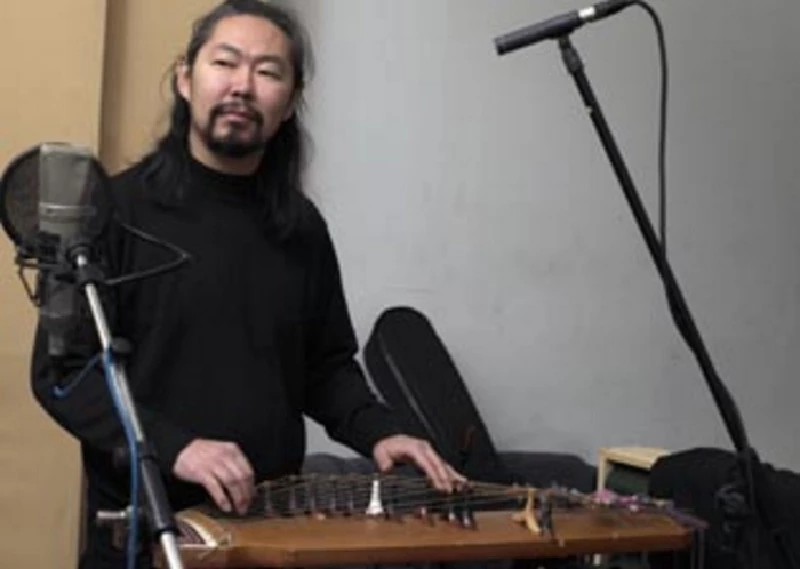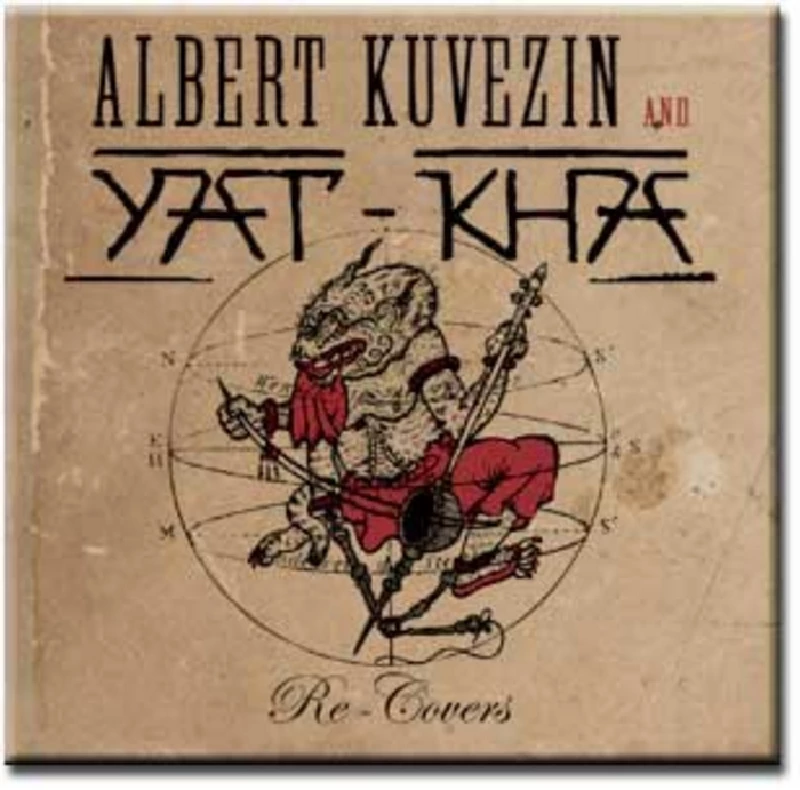Miscellaneous - Interview
by Anthony Dhanendran
published: 22 / 10 / 2005

intro
Siberian rockers and throat singers Yat Kha have just released 'Re-Covers', an album of covers of songs by largely British artists including Led Zeppelin and Joy Division. Anthony Dhanendran talks to front man Albert Kuvezin about it
Albert Kuvezin sings from the heart. And the throat. Pennyblackmusic caught up with the Tuvan rock throat-singer and his band Yat Kha at Ronnie Scott’s club in London during their recent tour of the UK. The physicist and polymath Richard Feynman is probably an unlikely person to begin with in a discussion of popular music. Feynman, who died in 1988 and is generally regarded as one of the greatest physicists of the 20th century, is best known for Feynman diagrams, which depict the interactions of sub-atomic particles. Tuva, on the other hand, is a tiny land in Siberia, in central Russia, right on the country’s border with Mongolia. Its best-known contribution to world culture is khoomei, or Tuvan throat-singing, which is where the country’s story merges with the physicist’s. Feynman’s great contribution to music was to help bring Tuvan throat singing to a global audience. Yat Kha are the beneficiaries of that audience. The band’s leader Albert Kuvezin grew up in Tuva listening illicitly to Western music that had been brought in by soldiers or students. “There was only one record company in those days, which belonged to the state,” says Albert. “We never heard rock or Western music until Perestroika in the 1980's. There was a black market in tapes, involving students who were studying in Moscow, and sailors who came from Japan and brought music with them – Deep Purple, Led Zeppelin. All rock music was underground.” When he began to make music of his own, it was only natural that he would seek to join the throat singing techniques he had learned as a child with the rhythms and styles of the Western rock music he had, likewise, grown up with. No-one seems to know why throat singing exists, or how it came to be. It is similar to the Western art of overtone or harmonic singing, and it sounds a little like a tuneful snore. The way to throat-sing is to vibrate the vocal folds in your throat as air travels through them, which creates harmonic resonances. It’s not to be tried at home, not without a glass of water handy, anyway. The harmonics create overtones, which allow the singer to sing at more than one pitch at once, which is what gives Tuvan music its unique, remarkable timbre. Before the fall of the Soviet Union, Albert says he couldn’t get permission to play gigs. “There was a commission who gave artists permission to play in public, made up of communist party officials and bosses.” Albert’s early bands played for friends, in tiny clubs or in people’s garages. “You were off if you wore jeans, had long hair, or played loud. Or, of course, if you played rock.” He insists that everyone can throat-sing, with a little practice, although he stops short of giving a lesson there and then. “It’s just the same as other musical skills,” he says. “In our country, throat singing is traditional, and from the time we are babies we listen to that music and children start to sing it themselves. I began to sing quite late, at the age of 17, but I had some good teachers, who I worked with after music college.” Albert got himself a gig playing bass with the state ensemble of dance and music, but it wasn’t until the early 1990's, having moved to Moscow, that he embarked upon forming Yat-Kha. The current band was founded in Moscow 14 years ago, when Kuvezin began collaborating with the Russian composer Ivan Sokolovsky. The pair of them took the name Yat Kha, which refers to a zither-like instrument that Kuvezin sometimes plays. The group melded traditional Tuvan sounds with Western music, both rock and electronic, and they released an album, 'Yat Kha', in 1993. Kuvezin has since released five more albums under the Yat Kha name, from 1995’s 'Yenisei Punk' to 'Re-Covers', ten years on. 'Re-Covers' is Kuvezin’s attempt to stamp his mark on some of the songs that influenced him when he was growing up. It’s also a way to acknowledge and thank those artists and influences. Unlike most such world music projects, where the heart sinks upon learning that some odd band is recording rock covers, 'Re-Covers' actually works, partly because Kuvezin seems to really feel the music in his bones, and partly through that strange musical condition in which things just, sometimes, come together. At the moment the band are touring the new album, taking in China (Guangdong province and Beijing) and now Britain. “Until today”, Albert says, “we were in between. Not traditional music and not Western rock music, but a mixture of the two. Sometimes we’d be playing festivals of world music, and we would be too loud, and other times we’d play rock festivals and we wouldn’t be loud enough. One of the reasons for 'Re-Covers' is to show our audience that we know rock and roll very well from our early days.” At the same time, he says he doesn’t want to pretend to be a Western rocker. In fact, Kuvezin and one of the other band members still live in Kyzyl, Tuva’s capital. But he’s quick to add that rock and roll has always been an influence: “Most of our songs from the early days have some rock influence. Usually Led Zeppelin.” The band cover Led Zeppelin 4’s 'When the Levee Breaks' as the first track on the new album. When they play it as their opening song at Ronnie Scott’s later that night, Kuvezin will introduce it, somewhat misguidedly but endearingly, as a tribute to those affected by the flooding in New Orleans caused by Hurricane Katrina. Richard Feynman never made it to Tuva – the Cold War was still raging and visas for central Russia were particularly hard to come by. But his attempts to get there were recorded in Ralph Leighton’s 'Tuva or Bust', a great primer for anyone interested in the country – and one that Albert recommends. He says that it’s easier now for people to get into the tiny country. “There are more and more foreigners every summer. But it is still the same there. It used to be unknown, because it is so remote. It was only known because of the style of singing of the people.” The band are not going to take a break after this long tour, though. They are ready to record a new album, says Albert, and this time it’s not going to be covers. It will be their own songs, he says, but they will still continue to mix rock and traditional music. “My dream is to build a studio in my home country, where I can record, and invite other musicians to come and play.”
Picture Gallery:-


most viewed articles
current edition
Peter Doherty - Blackheath Halls, Blackheath and Palace Halls, Watford, 18/3/2025 and 21/3/2025Armory Show - Interview with Richard Jobson
Liz Mitchell - Interview
Lauren Mayberry - Photoscapes
Deb Googe and Cara Tivey - Interview
Max Bianco and the BlueHearts - Troubadour, London, 29/3/2025
Garfunkel and Garfunkel Jr. - Interview
Sukie Smith - Interview
Maarten Schiethart - Vinyl Stories
Clive Langer - Interview
previous editions
Heavenly - P.U.N.K. Girl EPBoomtown Rats - Ten Songs That Made Me Love....
Trudie Myerscough-Harris - Interview
Doris Brendel - Interview
Oasis - Oasis, Earl's Court, London, 1995
Beautiful South - Ten Songs That Made Me Love...
Dwina Gibb - Interview
Pulp - Ten Songs That Made Me Love...
Kay Russell - Interview with Kay Russell
Sound - Interview with Bi Marshall Part 1
most viewed reviews
current edition
Davey Woodward - Mumbo in the JumboNigel Stonier - Wolf Notes
Wings - Venus and Mars
Kate Daisy Grant and Nick Pynn - Songs For The Trees
Only Child - Holy Ghosts
Neil Campbell - The Turnaround
Philip Jeays - Victoria
Darkness - Dreams On Toast
Suzanne Vega - Flying With Angels
Charles Ellsworth - Cosmic Cannon Fodder
Pennyblackmusic Regular Contributors
Adrian Janes
Amanda J. Window
Andrew Twambley
Anthony Dhanendran
Benjamin Howarth
Cila Warncke
Daniel Cressey
Darren Aston
Dastardly
Dave Goodwin
Denzil Watson
Dominic B. Simpson
Eoghan Lyng
Fiona Hutchings
Harry Sherriff
Helen Tipping
Jamie Rowland
John Clarkson
Julie Cruickshank
Kimberly Bright
Lisa Torem
Maarten Schiethart